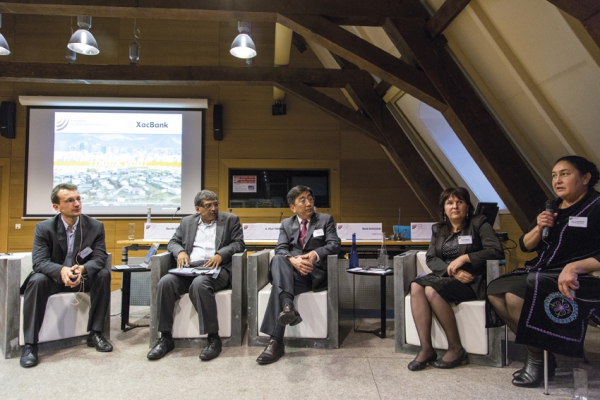Plenary: 5th European Microfinance Award on Microfinance and the Environment
- Davide FORCELLA, ULB-CERMi
- K. Paul THOMAS, ESAF Microfinance and Investments India
- Olesya PAUKOVA, Kompanion Financial Group Kyrgyzstan
- Bold MAGVAN, XacBank LLC Mongolia
PRESENTATIONS
Davide FORCELLA welcomed the audience emphasizing it was a great pleasure to present the finalists of the 5th European Microfinance Award. He explained that green microfinance is a multidimensional topic and it includes initiatives that go from "do not harm", like environmental risk management policies, to activities that aim for positive environmental outcomes, such as specific green credits for renewable energies or agroforestry. Mixing microfinance with environment includes difficulties and trade-offs. For example, is there enough human capital and financial capacity in the MFIs to implement such programs? Certain trade-offs could exist between the economic, social and environmental goals of the MFIs. However, Forcella remarked that green microfinance also presents interesting opportunities for MFIs and clients in terms of risk and cost reduction, the support of income generating activities, market differentiation, social impacts, etc. One of the major challenges today is to find ways to scale up such programs and identify and replicate well performing business models. He then introduced the finalists and gave them the floor.
Olesya PAUKOVA of Kompanion Financial Group, Kyrgyzstan explained how the MFI provides financial products to rural populations in Kyrgyzstan. Kyrgyzstan is mainly an agricultural country and people's assets mostly comprise of land and livestock. However, the country suffers from widespread land degradation especially in rural areas, decreasing the productivity of livestock and of Kompanion's clients' incomes. In order to address this problem, Kompanion started providing microloans in combination with technical assistance to small-scale farmers and livestock herders. Kompanion offers a specialized "Credit for Conservation" loan which is linked to training programs for livestock farmers on grazing land management and preservation. Veterinarians and agronomists work with Kompanion to provide these trainings. Paukova mentioned that due to the network effect, training is passed on to other benefciaries. Since 2011, participants have increased their income by 30% while their costs decreased by about 15%.
Paul THOMAS of ESAF Microfinance and Investments, India started his presentation by thanking the audience for their interest and the Selection Committee for selecting him as one of the three finalists. He explained that ESAF India started in 1992 as an NGO but transformed into a Non-Banking Finance Company (NBFC-MFI) in 2008. ESAF's environmental policy is focused on building awareness on environmental protection and facilitating access to clean energy and natural resources for the economically deprived, while at the same time providing appropriate financial services. He explained how a large part of its clients use unhealthy polluting methods for lighting (kerosene), and for cooking (firewood), and also they do not have access to safe potable water. To address these problems, ESAF offers loan products for household water and sanitation improvements, clean energy and microenterprise development. The Award initiative provides rural clients with solar energy solutions, efficient cook stoves and water filters.
Bold MAGVAN of XacBank LLC, Mongolia started by explaining that Ulaanbaatar, the capital of Mongolia is the second most polluted capital in the world due to the heavy carbon emission from the use of inefficient stoves and ‘ger' design. Gers are portable huts used as homes by nomads, which usually lack sufficient insulation against the cold. Two thirds of the Mongolian population living in the capital burn coal and wood to keep warm during the nine month winter at temperatures as low as -40 degrees Celsius. In order to address this problem, XacBank initiated the "Eco Product Program" that promotes energy efficient heating and insulation blankets to poor ger district households. These products are delivered to the residence after the beneficiary pays the invoice or takes out a microloan to pay for the products, and they are installed for the family. Old products are removed and brought to a dismantling facility to prevent them from being used by another household. This initiative resulted not only in a decrease in heating expenses for households but also in a reduction of carbon emissions by an estimated 380 thousand tons.
DISCUSSION

Forcella opened the discussion by asking the finalists what the main challenges and strategies were during the implementation of their programs. According to Thomas, the main challenges were to supply the products to clients living in remote locations and find funding. To overcome these problems, ESAF received assistance from an associate company to negotiate with suppliers and manufacturers of products and got micro-retailers to manage distribution. Magvan mentioned that the biggest challenge is the lack of incentive to save energy as the government is subsidizing coal prices. Paukova mentioned that it is challenging to find highly qualified agronomists and veterinarians who can provide trainings for their clients in remote rural areas.
To round up the session and proceed to the Award Ceremony where the winner was to be announced, Forcella asked about the ways of scaling up a green microfinance program. Thomas explained that first of all, such a program has to be sustainable for all shareholders and the solutions offered must be financially viable for clients. Magvan mentioned that to scale up XacBank's initiative, the government needs to provide incentives to people to raise their environmental standards. Client affordability is also crucial for scaling up. Paukova talked about attracting more investors and promoting access to rural remote areas.
